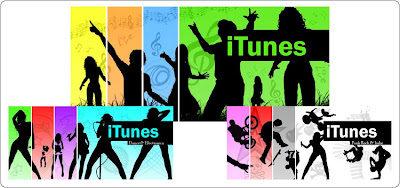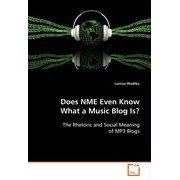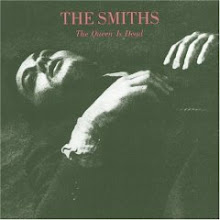Largely unbeknownst to me, it seems my last, rather informal, post on the differences between music blogs with MP3s and those without became a wee bit of a meme (let's put it this way - I got far more mentions on other blogs, feeds and sites than I ever had before and would ever had expected from my cobwebby corner of cyberspace). Now that my MA thesis on MP3 blogs' rhetoric and social meaning is finished, and now that I've thought myself into a nervous breakdown of sorts, I have a few more opinions about this topic that I came to while finishing the behemoth.
Before I explore my own arguments a little further, I would like to address a few different opinions that seemed to emerge in reaction to my earlier post. Firstly, I found a post from
incidentals and accidentals, which took issue with the fact I said posting music that you didn't like would be a waste of time, especially for those who write music blogs for a hobby. This blogger's exact words were:
This is the line of thinking that always really burns me. All the kvetching about the sheeplike tendencies of mp3 blogs is precisely related to the fact that so many bloggers think it’s a waste of time to talk about stuff they don’t like. More specifically, to articulate why something isn’t good, beyond a mere “this sucks” lobbed into a comments box or message board. It’s not a waste of time, particularly if you value the fact that people are regularly reading your blog. Dislikes give shape to likes. The fact that someone might be able to explain why they think one artist is shit might add weight to an argument for another artist’s strengths. I’m not saying you have to get into compare-and-contrast lists, but regular readers will grow to know and trust your tastes.Oh and the whole thing about text-heavy bloggers being largely professional critics - Personally I’m an exception to that idea, and I know there are plenty of other exceptions as well. Again it just goes to this whole idea of people not wanting blogging to be “a waste of time” - as if one can’t write seriously about music for fun, sans paycheck. That is the hobby! Putting an mp3 online is not a hobby, it’s an impulse.This is an interesting point - dislikes do throw your likes into relief. Perhaps to clarify my "waste of time" comment, I could argue that posting MP3s of music you hate seems counterintuitive ("Please take the time to download and listen to this song that I just provided a solid argument against listening to"). I'll be looking into the significance of MP3s as a medium later in this post. However, just as I can't assume that everyone writes positively about music (which I don't), no one else can assume that bloggers should write some negative reviews, or in fact, that they all do. I've come across many blogs who do either or both, showing that time and time again, MP3 blogs cannot be lumped together into one general genre of media. It's pretty much impossible to make any generalizing statement at all - the same blog can be different things between different posts. Like this blogger from incidentals and accidentals says, there are too many exceptions. There is also an implication in this blogger's argument that a certain type of MP3 blog is more valuable and "truer" to the genre than others, these "others" being those who just post MP3s rather than write text-heavy opinions or criticism; that those who just post MP3s are less thoughtful, less perceptive, and somehow acting on a lower, more instinctual level than one of higher, intellectual deliberation. This implication points once again to purpose, which I will get to shortly.
I also had a couple of interesting comments left on the post itself, one of which provided a link to
Nevver, an MP3 blog which just posts photos and MP3s without any text, implying rather than explicitly stating connections between the two forms of art. This example takes MP3 blogs to their extreme conclusion, where words are no longer necessary. Another comment was also very helpful in that it drew a line between MP3 blogs being the new radio whilst music blogs are discussion and opinion, comparing MP3 bloggers to DJs. Together, these comments really got me thinking about why people create and maintain MP3 blogs, and the connection between
how they do it and
why they do it.
Now, after sorting out some rather ridiculous Kenneth Burke Dramatistic ratios about MP3 blog rhetoric, I learned a few things. The most significant one is that MP3 blogs are in no way a cohesive body with the same purposes; these purposes, however, do vary depending on which media the MP3 blogger favours to remediate, in other words, the agency he/she utilizes to convey his/her purpose and act. But how does the purpose affect the choice of agency? Or is it the other way around with the agency affecting the purpose, and then the act itself? I'm inclined to believe and argue the latter.
Let me track back a bit to remediation, which is how a medium re-uses and re-interprets a different medium. Remediation can work backwards and forwards, meaning that television is a remediation of film, which came before it, but it can also increasingly be seen in terms of interactivity, as a remediation of the Internet, which came after television. I see MP3 blogs as a remediation of the diary, music journalism/criticism, fanzine, pirate/alternative radio, and mixtape. These are the media, with their attendant purposes, that shape the purposes of MP3 blogs.
The diary element of MP3 blogs affects the purpose by making it personal and reinforcing the affective relationship between the blogger and the music he/she is writing about. This diary remediation shifts commentary into a subjective rather than objective direction, and serves to highlight the newer development of blurring between public and private, which combines self-disclosure with self-promotion. The self-promotion characteristic innate in blogs, evidenced by site traffic meters and inclusion on aggregators, is one that can gain a lot of criticism, especially when traffic and attention becomes the primary motive; however, this attitude presupposes that MP3 blogs as a genre should be something purer of motive, where only the music matters, which is an assumption that ignores the inherent and inherited diary element remediated in the blog medium. Even if one doesn't believe they're promoting him/herself along with the music featured, the very fact the blog is made public and that there is the concern for appearing trustworthy and credible, including having enough subcultural capital, makes the MP3 blog a site of self-promotion.
The music journalism/criticism remediation is one on which those who believe in an MP3 blog revolution would depend. With the access that the Internet brings, amateur writers can research and publish their own pieces about music. It is too simple to say that MP3 blogs have replaced or will replace traditional music journalism, and the fact this remediation is also bound up with public relations/promotional remediation and self-promotion makes it less clear-cut a substitution. The fanzine remediation is connected to the rather positive impulse of celebrating and promoting music that one loves, which I mentioned in the earlier post, and to a more subcultural purpose, supposedly working against and in spite of the mainstream media, promoting artists who don't get promotion through mainstream channels. However, it is also too simplistic to think that MP3 blogs are actually sticking it to the man, even if their rhetoric says they are. The symbiosis of mainstream media and subcultural media is too much a part of subculture as a concept for MP3 blogs to exist in an alternative vacuum, shunning all mainstream media. Even in defining oneself against mainstream media (ie: criticizing
NME in a post), one uses and depends on the mainstream for identity and position.
The remediation of the aural media of radio and mixtape is very signficant in that it brings collection, selection, and organization into the foreground of MP3 blog purpose rather than commentary and opinion. Like DJs and mixtape makers, MP3 bloggers attribute meaning to which music they collect and then to how they present it, often without text. While the radio remediation allows for brief background and commentary about tracks (as opposed to lengthy criticism and commentary), the mixtape remediation actually offers music to blog vistors like a word-of-mouth gift - the receiver not only gets to listen to it, but gets to keep it. The mixtape remediation is pervasive in both MP3 blog content and the musical end of the Internet, including sites like
Muxtape and technology like
Mixas, emphasizing the fanatical impulse for collection, selection, and arrangement along with love and passion for music as motive. Ultimately, MP3 blogs are a bricolage of media that came before them, making them rather slippery to define as a genre.
While it becomes difficult to classify MP3 blogs as a genre based on purpose, the one aspect that does hold the genre together is the MP3s themselves. Regularly posting MP3s on your blog simply makes your blog an MP3 blog. MP3s themselves are fundamental to the medium of MP3 blogs. To get all McLuhan on you, "the medium is the message," and in this case, the MP3 is largely the message. In the Burkean sense, if every selection of reality is both a reflection and a deflection, making most statements, textual or not, rhetorical and/or persuasive, then the mere selection that MP3 blogs employ by choosing the MP3s they feature for download automatically deflects other choices, implying preference and value to music without having to explicitly state anything negative. Or positive. Or to state anything at all. The very act of selection is persuasive, and is made even more salient by the fact MP3 files are included. In this way, MP3s speak and argue for themselves just as other non-verbal elements like images can. Furthermore, blogs, which are of course actually "web logs," have an inherent filter/selection function in which hyperlinks act as both evidence and a record of "pre-surfed" and pre-approved information. Rather than convince by authority and "unquestionable" sources alone, which journalists and critics depend on, bloggers convince by providing a way for their readers to participate in the information they consume, assuming a more active role. With this in mind, MP3s are the primary links provided in MP3 blogs, providing support for the blogger's claims, and their very existence argues for pre-approved content.
Ultimately, MP3 blog influence is far less than many bloggers would believe it is or like it to be. While aggregators like The Hype Machine and Elbows do collect and reify disparate blogs, giving the impression of power and solidarity, they do not set the agendas as much as they would imply. For the most part, the most popular MP3 blogs are reactive rather than proactive in music selection. Unless more bloggers actually exclusively search out new, mostly unsigned, artists and collectively promote them to the point they "break" into the consciousness of those outside of the music blogosphere, they cannot be said to have all that much power to change the system already in place.
We cannot herald the MP3 blog as the substitute for music journalism/criticism, nor for radio, because in remediation, it is much more and much less depending on which aspects are focused upon. For as many people as have access to the Internet there are as many opinions, especially about what MP3 blogs should be, and more importantly, what they should do. I fully acknowledge this plurality, and whether bloggers use MP3 blogs to criticize, to promote, to share, or to express themselves, they are collectively an organism still growing and changing. And since the Internet is a fickle medium, turning attention into one of the rarest commodities, all MP3 bloggers can hope for is their slice of a fragmented, but loyal audience that believes in the purpose presented. Whatever purpose that may be. I, for one, am still thinking about it.






























































